Comprehensive Guide to Garden Maintenance in Forest Lodge
Introduction to Garden Maintenance
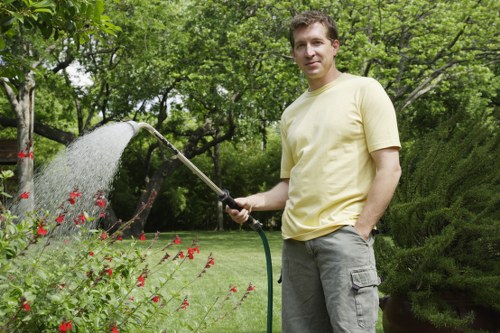
Maintaining a beautiful garden in Forest Lodge requires a blend of knowledge, dedication, and the right techniques. Whether you're a seasoned gardener or a novice, understanding the unique aspects of this area's climate and soil is crucial for thriving greenery.
Forest Lodge offers a diverse range of plant species, each with its own set of care requirements. From vibrant flowers to sturdy shrubs, proper garden maintenance ensures that your outdoor space remains lively and inviting throughout the year.
In this guide, we will explore essential garden maintenance practices tailored specifically for Forest Lodge, helping you achieve a picturesque and healthy garden.
Essential Garden Maintenance Tasks
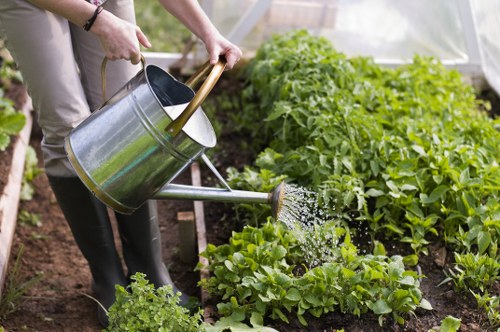
Regular garden maintenance involves several key tasks that contribute to the overall health and appearance of your garden. Let's delve into the most important ones:
1. Pruning and Trimming
Pruning is essential for removing dead or diseased branches, promoting healthy growth, and maintaining the desired shape of your plants. Regular trimming ensures that your garden remains tidy and that plants receive adequate sunlight and air circulation.
2. Weeding
Weeds compete with your plants for nutrients, water, and sunlight. Consistent removal of unwanted vegetation helps your garden plants thrive without unnecessary competition.
3. Watering
Proper watering is critical, especially during dry spells. Understanding the specific water needs of your plants ensures they receive adequate hydration without being overwatered, which can lead to root rot and other issues.
Seasonal Garden Maintenance
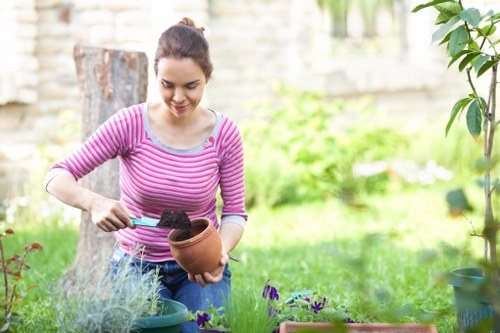
Each season brings its own set of challenges and opportunities for garden maintenance. Adapting your care routine to the seasonal changes in Forest Lodge will help your garden flourish year-round.
Spring Maintenance
Spring is the time for rejuvenation. Begin by clearing any debris that accumulated over the winter. Plant new flowers and shrubs, and fertilize your soil to provide the necessary nutrients for growth.
Summer Care
During the summer months, focus on watering, mulching, and pest control. Ensure your plants are well-hydrated and protected from pests that thrive in warmer weather.
Autumn Preparations
As temperatures drop, prepare your garden for winter by mulching, pruning, and planting perennials that can withstand the colder months. This ensures your garden remains healthy and ready to bloom again in the spring.
Choosing the Right Plants for Forest Lodge
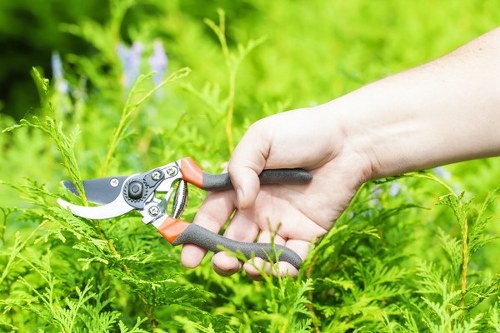
Selecting plants that are well-suited to Forest Lodge's climate and soil conditions is fundamental to successful garden maintenance. Native plants often require less maintenance and are more resilient to local pests and diseases.
Consider the light exposure in your garden when choosing plants. Some thrive in full sun, while others prefer shade. Understanding the specific needs of each plant will help you create a harmonious garden environment.
- Perennials: Plants that return year after year, offering long-term beauty with minimal replanting.
- Annuals: Seasonal plants that provide vibrant colors and can be changed each year for variety.
- Shrubs and Trees: Provide structure and height, serving as the backbone of your garden design.
Soil Health and Fertilization
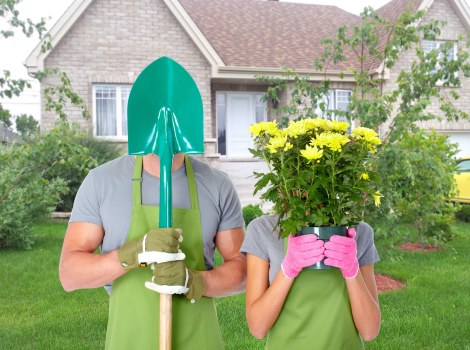
Healthy soil is the foundation of a thriving garden. Regularly testing your soil's pH and nutrient levels can guide your fertilization practices, ensuring your plants receive the necessary sustenance.
Incorporate organic matter such as compost or manure to improve soil structure and fertility. This enhances moisture retention and provides a natural source of nutrients for your plants.
- Composting: Recycling kitchen and garden waste into nutrient-rich compost.
- Mulching: Applying a layer of organic material to retain moisture and suppress weeds.
- Natural Fertilizers: Using plant-based or animal-based fertilizers to nourish your garden organically.
Pest and Disease Management

Protecting your garden from pests and diseases is vital for maintaining plant health. Integrated Pest Management (IPM) is an effective approach that combines various strategies to minimize pest damage while reducing environmental impact.
Identifying Common Pests
Regularly inspect your plants for signs of pests such as aphids, caterpillars, and beetles. Early identification allows for prompt action to prevent infestations from spreading.
Natural Pest Control Methods
Utilize natural predators like ladybugs and praying mantises to control pest populations. Additionally, organic pesticides made from neem oil or insecticidal soaps can be effective without harming beneficial insects.
Landscape Design and Aesthetics

A well-designed garden not only looks beautiful but also functions efficiently. Consider the layout, plant selection, and decorative elements to create an appealing and sustainable garden space.
- Plant Arrangement: Group plants with similar needs together to simplify maintenance and enhance visual appeal.
- Pathways and Walkways: Incorporate paths to navigate your garden easily and prevent soil compaction.
- Water Features: Adding elements like fountains or ponds can create a calming atmosphere and support local wildlife.
Incorporating Hardscaping Elements
Hardscaping features such as patios, decks, and pergolas provide functional spaces for outdoor activities and add structural interest to your garden.
Using Lighting for Garden Enhancement
Strategic lighting can highlight key features of your garden, extend usability into the evening hours, and enhance overall safety.
Tools and Equipment for Effective Maintenance

Having the right tools and equipment is essential for efficient garden maintenance. Investing in quality tools can save time and effort, making your gardening tasks more manageable.
- Pruners and Shears: For precise trimming and shaping of plants.
- Garden Forks and Shovels: Essential for digging, aerating soil, and turning compost.
- Watering Systems: Automated sprinklers or drip systems ensure consistent watering with minimal manual effort.
- Protective Gear: Gloves, hats, and knee pads protect you while you work in the garden.
Maintenance of Tools
Regularly clean and sharpen your tools to maintain their effectiveness and extend their lifespan. Proper storage also prevents rust and damage.
Sustainable Gardening Practices

Sustainability in gardening focuses on environmentally friendly practices that promote biodiversity and conserve resources. Implementing these methods in Forest Lodge contributes to a healthier ecosystem and reduces your garden's ecological footprint.
Water Conservation
Utilize rain barrels to collect rainwater for irrigation, and employ mulching to reduce water evaporation from the soil. These practices help conserve water and ensure your plants receive sufficient moisture.
Composting and Recycling
Turning organic waste into compost enriches your soil naturally, reducing the need for chemical fertilizers. Recycling materials like wood and metal can also minimize waste and promote resource efficiency.
Supporting Local Wildlife
Create habitats for beneficial insects, birds, and other wildlife by planting native species and providing shelter. This enhances biodiversity and helps maintain a balanced garden ecosystem.
Local Gardening Resources in Forest Lodge

Access to local gardening resources can significantly enhance your garden maintenance efforts in Forest Lodge. From nurseries to community groups, these resources provide valuable support and information.
- Local Nurseries: Offer a wide selection of native plants and knowledgeable staff to assist with plant selection.
- Community Gardens: Provide opportunities to share gardening tips and collaborate with fellow enthusiasts.
- Workshops and Seminars: Educational events that cover various gardening topics and techniques.
Online Resources
Numerous online platforms and forums allow you to connect with gardeners in Forest Lodge, exchange ideas, and seek advice on specific challenges.
Local Gardening Services
Professional gardening services in Forest Lodge offer tailored maintenance solutions, from routine upkeep to specialized landscaping projects.
Nearby Areas to Forest Lodge

Forest Lodge is surrounded by several vibrant communities, each offering unique features and proximity that make garden maintenance convenient and diverse.
- East Forest: Just 2 miles away, known for its extensive floral nurseries.
- Greenwood: Located 3 miles north, offering numerous community gardens and green spaces.
- Maple Ridge: 4 miles west, home to specialized garden supply stores.
- Willowbrook: 5 miles south, featuring beautiful riverside gardens.
- Pineview: 6 miles east, renowned for its forested landscape and natural plant varieties.
- Sunnyvale: 7 miles northwest, with ample sunny spots perfect for thriving gardens.
- Lakeside: 8 miles southwest, known for its water features and aquatic plants.
- Rose Haven: 9 miles northeast, famous for its stunning rose gardens.
- Brookside: 10 miles west, offering lush greenery and shade-loving plants.
- Hillside: 11 miles south, ideal for hillside gardening and terracing.
Advanced Garden Maintenance Techniques

For those looking to take their garden maintenance to the next level in Forest Lodge, several advanced techniques can enhance both the functionality and beauty of your outdoor space.
Soil Testing and Improvement
Conduct regular soil tests to monitor pH levels and nutrient content. Based on the results, amend your soil with appropriate fertilizers or soil conditioners to create an optimal growing environment.
Controlled Irrigation Systems
Install drip irrigation or soaker hoses to deliver water directly to the plant roots, minimizing evaporation and ensuring efficient water usage.
Vertical Gardening
Maximize space and add visual interest by incorporating vertical gardening structures such as trellises, pergolas, and wall-mounted planters.
Integrated Pest Management (IPM)
Adopt a holistic approach to pest control by combining biological, cultural, and mechanical methods to manage pests sustainably and reduce reliance on chemical pesticides.
Companion Planting
Strategically plant compatible species together to enhance growth, deter pests, and improve overall garden health. Companion planting can also contribute to a more diverse and resilient garden ecosystem.
DIY Garden Projects for Forest Lodge

Engaging in DIY garden projects can be both fun and rewarding, allowing you to personalize your garden maintenance routines and add unique elements to your outdoor space.
- Building Raised Beds: Create elevated garden beds to improve soil drainage and facilitate easier maintenance.
- Constructing Compost Bins: Set up your own composting system to recycle organic waste and enrich your soil naturally.
- Installing Rainwater Harvesting Systems: Collect and store rainwater for sustainable irrigation.
- Creating a Fairy Garden: Add whimsical elements to a small section of your garden for a touch of magic.
- Setting Up a Greenhouse: Extend your growing season and protect plants from harsh weather conditions.
Tool Storage Solutions
Organize your garden tools efficiently by building storage sheds or implementing vertical storage racks, ensuring that your tools are easily accessible and well-maintained.
Common Challenges in Garden Maintenance

Maintaining a garden in Forest Lodge comes with its set of challenges, but with the right strategies, these obstacles can be effectively managed.
Dealing with Pests and Wildlife
Wildlife such as deer, rabbits, and birds can cause significant damage to your garden. Implementing physical barriers, using repellents, and planting resistant varieties can help mitigate these issues.
Managing Weeds
Persistent weeds can quickly overrun your garden. Regular weeding, mulching, and using landscape fabric are effective methods to control weed growth.
Soil Erosion
Prevent soil erosion by employing groundcovers, installing retaining walls, and using proper irrigation techniques to maintain soil integrity.
Climate Variability
Adapting to weather changes is essential. Implementing flexible gardening practices and selecting resilient plant species can help your garden withstand unpredictable climate conditions.
Professional Garden Maintenance Services

While DIY gardening is rewarding, sometimes enlisting professional help can make a significant difference in maintaining your garden's health and beauty.
- Lawn Care: Experts can provide services like mowing, aeration, and fertilization to keep your lawn lush and green.
- Landscape Design: Professional designers can create customized garden layouts that maximize space and aesthetic appeal.
- Tree and Shrub Care: Arborists offer specialized care for larger plants, ensuring their longevity and structural integrity.
- Irrigation Systems: Professionals can install and maintain efficient watering systems tailored to your garden's needs.
- Pest Control: Integrated Pest Management services can effectively manage and prevent pest issues.
Choosing the Right Service Provider
Select a reputable and experienced garden maintenance service in Forest Lodge by checking reviews, requesting references, and ensuring they offer the specific services you need.
Benefits of Professional Maintenance
Hiring professionals saves you time, ensures high-quality care, and allows you to focus on enjoying your garden rather than managing its upkeep.
Conclusion

Maintaining a garden in Forest Lodge is a fulfilling endeavor that enhances the beauty and value of your property. By following the best practices outlined in this guide, you can cultivate a vibrant and sustainable garden that thrives in the unique conditions of Forest Lodge.
Whether you choose to handle the maintenance yourself or enlist professional services, the key to success lies in understanding your garden's specific needs and staying consistent with your care routine.
Start your garden maintenance journey today and transform your outdoor space into a lush, inviting retreat.
Contact us today to learn more about our garden maintenance services or book your service now and take the first step towards a stunning Forest Lodge garden.
